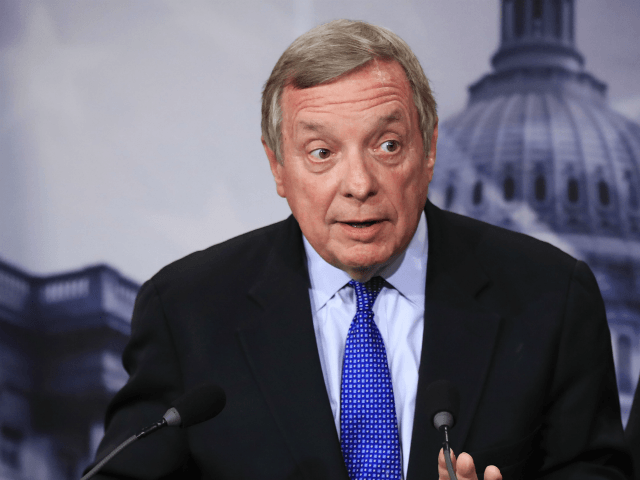Several Democratic Senators reduced their reelection chances by voting against President Donald Trump’s immigration reforms, the second-ranking Senate Democratic leader told National Public Radio.
The admission by Sen. Dick Durbin contradicts repeated claims by Democrats and by journalists that amnesty and immigration are popular priorities for voters.
As Democrats united on February 15 to block Trump’s four-part reform-and-amnesty framework plan, “I went around the floor to senators who have stood by me,” Durbin said, adding:
For some, it’s easy. For others, it is painful. It’s dangerous politically. As I went up to their desks – and many of them were up for re-election – I said ‘Thank you,’ and several of them said to me, ‘If this cost me my Senate seat, so be it.’ You know, those are moments you’re proud to be a senator.
Durbin and nearly all Democrats voted for the double-amnesty plan which was prepared by Democrats and GOP Maine Sen. Susan Collins. That plan offered a bureaucratic scheme for funding the wall in exchange for amnestying at least 2 million ‘DACA’ illegals and creating a “prioritization amnesty” for several million illegals who have jobs.
Similarly, nearly all Democrats voted against Trump’s framework plan, which would have swapped an amnesty for 1.8 million illegals in exchange for wall funding and three sets of legal reforms – ending the visa lottery, a ten-year phase-out of chain migration, and the closure of legal loopholes in the border-wall.
NPR did not ask which Senators agreed to risk their sets for the Democrats’ pro-migration policies.
However, several Democratic Senators are facing tough elections this November in states won by Trump in 2016. They include Florida’s Sen. Bill Nelson in Florida, North Dakota’s Heidi Heitkamp, Indiana Sen. Joe Donnelly and West Virginia Sen. Joe Manchin, Missouri’s Claire McCaskill, Montana’s Jon Tester, Nevada’s Dean Heller, Ohio’s Sherrod Brown and Pennsylvania’s Bob Casey, Wisconsin’s Tammy Baldwin.
On February 15, all Democratic Senators — except for three Democrats with safe seats — voted for Collins’ double-amnesty. Those three held their votes against the proposal until the scoreboard showed it was already defeated.
Just three red-state Democratic Senators voted for Trump’s framework plan, which was included in a proposal by Iowa Sen. Chuck Grassley. They were Heitkamp, Donnelly and Manchin.
Roughly 14 GOP Senators voted against Trump’s reforms, mostly to protect their donor’s supply of cheap labor.
The immigration issue is likely to be played up in the 2018 election, despite efforts to downplay the issue by the GOP’s Senate campaign leader, pro-amnesty Colorado Sen. Cory Gardner. For example, Rep. Todd Rokita is citing the immigration issue in the Indiana GOP’s Senate primary.
Despite Durbin’s admission of political risk, the NPR reporter pushed the claim that an amnesty is popular — and Durbin played along.
NPR: But you already have public opinion on your side. A CBS poll earlier this month said 9 out of 10 Americans support providing citizenship for DACA recipients. You’ve got the public support. What more do you need at this point?
DURBIN: And 9 out of 10 Americans are for universal background checks on guns, yet the Republican leadership in the House and Senate and in the White House have refused to take up these immensely popular issues.
NPR’s enthusiasm for cheap-labor service-worker immigration is reflected by many other similar journalists.
Business groups and Democrats tout misleading, industry-funded “Nation of Immigrants” polls which pressure Americans to say they welcome migrants, including the roughly 680,000 ‘DACA’ illegals and the roughly 3.25 million ‘dreamer’ illegals.

COMMENTS
Please let us know if you're having issues with commenting.